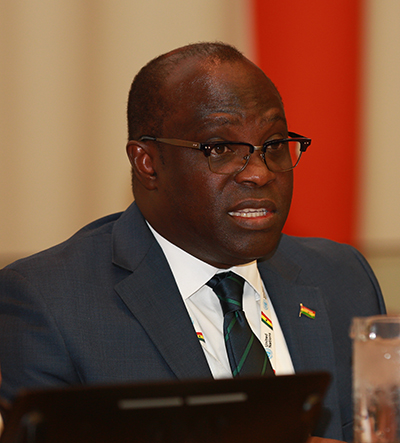


Committed to Sustainable Cities and Human Settlements for All

In Special Consultative Status with ECOSOC

STATEMENT BY
HAROLD ADLAI AGYEMAN
AMBASSADOR AND PERMANENT REPRESENTATIVE
OF GHANA TO THE UNITED NATIONS
OBSERVANCE OF WORLD CITIES DAY 2024
UNDER THE THEME
INVIGORATE INNOVATION AND LOCAL LEADERSHIP
FOR A SUSTAINABLE URBAN FUTURE
Mr. Moderator
Excellencies,
Ladies and Gentlemen,
Let me begin by expressing my appreciation for the invitation extended to me to be part of today’s important event. I thank the organisers for their efforts and especially commend Ambassador Odo and the Vanuatu Permanent Mission for their dedication and commitment to the 19th Annual Session of the Global Forum on Human Settlements.
Since 1950, when 30 percent of the world’s population lived in urban areas, the growth trajectory of urbanisation has been firm. Today, more than 4 billion people, and over 55 percent of the world’s population live in urban areas, and this figure is estimated to grow to 68 percent by 2050.
With the growing trend of urbanization, it is crucial to properly acknowledge the role of cities in sustainable development and responsibly manage the impact of urbanization on economic, social, and environmental aspects of life.
As we, therefore, mark the 2024 World Cities Day, at the end of this month, it is an important opportunity to assess where we are and what more we can do to facilitate a sustainable urban future.
In the adoption of the sustainable development agenda for 2030, we collectively expressed in SDG 11 a commitment to make cities and human settlements inclusive, safe, resilient and sustainable.
Regrettably, on average, only 16 percent of the SDG targets are on track to be met globally by 2030 and, as the 2024 Sustainable Development Report indicates, and SDG 11 is one (1) of the five (5) goals particularly offtrack.
Our efforts for the achievement of the 10 targets under SDG 11 should therefore be redoubled and the means provided for their implementation. As is known, urbanization is not uniform across the world and in Asia (50%) and Africa (43%), there is scope for growth. Since SDG 11 intersects with many other SDGs such as goals 1, 2, 3, 4, 5, 6, 8 and 10, it is important that we turbo-charge its implementation for the overall progress of the SDGs.
In several places across the world, urbanisation has coincided with GDP growth, job creation, increased human capital, decreasing poverty and expanding opportunities for the general wellbeing of populations. Admittedly, this positive outlook in some instances belies the challenges that is also quite often seen in many others in the form of urban insecurity, unplanned settlements such as slums and squatter settlements, overburdened urban infrastructure, and the concentration of growth and development in a few cities.
As we therefore consider the opportunities that the New Urban Agenda offers it would be important not to lose sight of how invigorating innovation and local leadership can help in the achievement of a sustainable urban future.
I will like to make three brief points in support of the theme before I bring my remarks to a close.
First, multilevel governance is important for driving urbanisation in the direction we want. National aspirations, policies and regulations for urbanisation should be an inspiration and not a constraint to local innovation. Where localities and cities have the drive for unique sustainable solutions for their human settlement needs, the governance framework should not be a hindrance. Far too often, the absence of seamless whole-of-government approaches have led to innovations being frustrated and prospective positive outcomes lost.
Secondly, sustainable development remains a long-term investment challenge and new public and private financing has to be evolved to address the growing need for affordable, well-planned, and sustainable human urban settlements. In far too many places in the developing world human settlements have become the outcome of chance and not the deliberate and purposive efforts of society. Within the context of the United Nations, and its resourced platforms such as the United Nations Capital Development Fund, we should be able to develop a model for long-term resource mobilisation that can be deployed for financing modern sustainable cities in the developing world, including leveraging the resources of Diaspora populations of the developing world.
Thirdly, innovation and leadership should not discount the unique solutions that individuals and entities in local communities offer for sustainability. The prioritisation of foreign solutions over local ones is often not helpful, and nature-based solutions should not be ignored where they make the best sense of what to do. Moreover, local leaders, including traditional leaders, who often wield influence over land ownership and usage, need to be empowered and made a force of good for sustainable human settlements, including for spatial planning and municipal services such as water and waste management.
Let me conclude by indicating that as a developing African country, Ghana continues to value the partnership it has multilaterally and bilaterally on the implementation of SDG 11. We believe that partnerships are useful for our common goals.
Finally, I wish this event the success it requires. May we all be reinvigorated by this event to work towards the goals for a sustainable future in all of our human settlements.
I thank you.
Copyright © Global Forum on Human Settlements (GFHS)
